Biology News
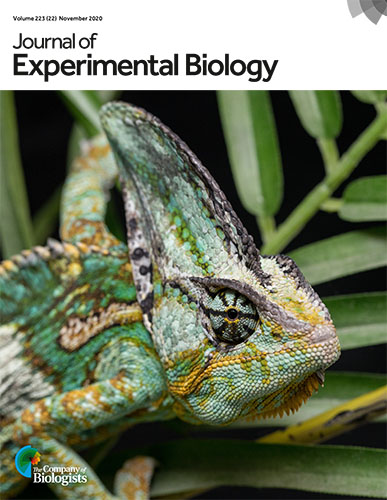
WKU research, photo featured on cover of biology journal
An article on research conducted at WKU and a photo of a chameleon by University Photographer Clinton Lewis are featured on the cover of the November 2020 issue of the Journal of Experimental Biology.
The article, The role of hyoid muscles in biotremor production in Chamaeleo calyptratus, spotlights groundbreaking work on chameleon communication conducted by former WKU graduate student Samuel M. Tegge, WKU biology professor Steve Huskey, University of South Dakota biology professor Christopher V. Anderson and WKU biology professor Michael E. Smith.“Sam conducted EMG’s (electromyography) on a number of muscles in the chameleon’s throat to determine which ones were active during vibrations in hopes of implicating the source of these biotremors,” Dr. Huskey said. “His work led to a manuscript recently published in the Journal of Experimental Biology which also featured cover photography by WKU’s university photographer Clinton Lewis of a male veiled chameleon housed in EBS. The research is groundbreaking and the cover art is a highly coveted spot. Congratulations to Sam, his co-authors, and Clinton for their amazing accomplishment.”
Contact: Steve Huskey, steve.huskey@wku.edu
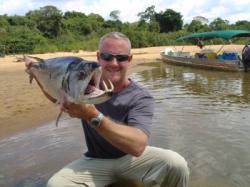
Biology faculty member’s research featured in NatGeo’s ‘Sea Strikers’
WKU biology faculty member Steve Huskey’s research on the feeding behaviors of high-velocity fish will be featured in Sea Strikers on National Geographic Channel.
Sea Strikers, part of National Geographic TV’s Naked Science series, will premiere at 9 p.m. (Central time) Aug. 26, 2011. (In the United Kingdom, Dr. Huskey’s research will be included in an episode of Hunters of the Deep on Aug. 21.)
Dr. Huskey, an associate professor in WKU’s Department of Biology, is a functional morphologist and studies the feeding mechanisms and feeding habits of fish.
Sea Strikers, filmed last summer near Boynton Beach, Fla., Jupiter, Fla., and the Florida Keys, takes advantage of high-speed video technology that Dr. Huskey utilizes in his research and provides never-before-seen footage of the feeding habits of the ocean’s top predators — goliath grouper, barracuda, mackerel, mahi mahi, wahoo, tuna, billfish and sharks.
Previews of the NatGeo episode are available online at:
* http://channel.nationalgeographic.com/series/naked-science/5159/Overview#tab-Videos/10712_00
* http://channel.nationalgeographic.com/series/naked-science/5159/Overview#tab-Videos/10713_00
* http://natgeotv.com/uk/hunters-of-the-deep/videos/blink-of-an-eye
Earlier this year, Dr. Huskey was featured in a National Geographic Explorer episode titled Megapiranha.
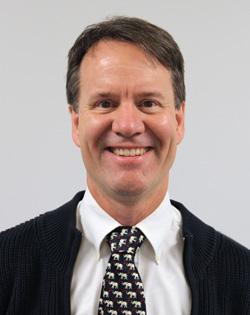 Dr. Schulte, published with the BBC for his work with African elephants - October
27, 2010
Dr. Schulte, published with the BBC for his work with African elephants - October
27, 2010
Dr. Bruce Schulte, Head of WKU’s Department of Biology, receives recognition for his work with African elephants by the British Broadcasting Company! Dr. Schulte’s work with the African elephant reveals the importance of their impact on African ecology. Elephants are known as ecological engineers because of their ability to create and modify ecosystems. The study is published in the African Journal of Ecology and was conducted in North-East Tanzania between August 2007 and February 2008 with a team from Georgia Southern University (GSU). The lead author is Nabil Nasseri who obtained his MSc at GSU. Dr. Lance McBrayer is a herpetologist who assisted with all aspects of the study. Dr. Schulte has continued his work on elephant behavior and ecology at WKU, including a study on Human-Wildlife and Human-Elephant Conflict recently funded by NSF and the Gates Foundation with WKU biologist Dr. Michael Stokes as the lead investigator. For more information on elephant impacts on trees and the effects on amphibians and reptiles, contact Dr. Schulte at the Department of Biology at WKU.
To see the entire story on BBC news please view this link.
Students respect ‘B-maker’ methods
The Bowling Green Daily News has been publishing a weekly article on WKU Distinguished Professors. This week (Monday September 27, 2010) Dr. Cheryl Davis, Full Professor of Biology, was highlighted. The following is a short synopsis of the article by Liz Switzer. The full article can be found at the Bowling Green Daily News website or in the published paper.
Western Kentucky University’s Department of Biology Distinguished Professor Dr. Cheryl Davis receives recognition for her outstanding work with WKU students. Dr. Davis’ teaching methods have led Biology students into earning doctoral degrees, medical degrees and to hold positions in scientific research. Her commitment to student success is reflected in her mentoring numerous undergraduate and graduate students. She has personally trained more than 60 undergraduates in her laboratory.
Dr. Davis is also the recipient of the Ogden College of Science and Engineering Outstanding Teaching award as well as Excellence in Teaching award from the WKU Student Government Association. Ogden College Dean Ferrell states “Dr. Davis is a fantastic teacher!”
Dr. Davis is also serving as the lead faculty representative to the Kentucky Biomedical research Infrastructure Network (KBRIN) and administers a portion of the Idea Networks of Biomedical Research Excellence (INBRE) grant. INBRE has continued to develop since award to WKU in 2001 resulting in over $3 million of additional funds for junior faculty to pursue research.
Davis’ active research and student involvement with Immuno-Parasitology has resulted in 24 master’s of science degree candidates and well over 60 undergraduates presenting papers at scientific conferences. Her work focuses on the Trypanosoma cruzi and Toxoplasma gondii. T. cruzi is the cause of Chagas disease which leads to heart disease and heart failure. T. gondii causes toxoplasmosis which is detrimental to pregnant women and AIDS patients.
To see the full article in the Bowling Green Daily News please follow this link.
WKU Receives $300,000 NSF Grant For Biotechnology Research - May 27, 2010
Western Kentucky University’s Biology Department has been awarded its first Research Experiences for Undergraduates (REU) grant from the National Science Foundation.
The $300,000 grant will provide nine students, including three 2010 graduates of the Gatton Academy of Mathematics and Science in Kentucky, intensive research training in WKU labs during the summer. The research program focuses on the interdisciplinary field of investigative biotechnology.
Students are assigned to a research project based on their interests. The projects are directed by WKU faculty mentors from Biology, Chemistry, Mathematics and Computer Science and the research topics encompass broad areas of biotechnology, including animal physiology, plant gene expression, microbiology, virology, biochemistry, protein structure and modeling, bioinformatics, neurophysiology and mathematical biology.
Students participating in the June 1-Aug. 6 program are: Melena Agyemang, Norfolk State University in Virginia; Mark Callaghan, California State University Monterey Bay; James Forshee, a Gatton Academy graduate from Simpson County; Alexander Hare, a Gatton Academy graduate from Rowan County; Hillary Jones, Georgetown College; Maggie Matheny, a Gatton Academy graduate from Lincoln County; Amanda Nolan, Stephen F. Austin State University in Texas; Stephanie Robey, Kentucky Community and Technical College System; and Shandrea Stallworth, Fort Valley State University in Georgia.
The students will work closely with their faculty mentor and interact with graduate students, post-docs, fellow undergraduates and research technicians. Students will participate in a series of Office of Scholar Development-sponsored workshops that will provide guidance on graduate school applications and grant writing and in a series of faculty-led seminars on reading professional literature and giving scientific presentations.
Through their participation in the WKU REU program, students will gain knowledge in a variety of research areas and develop the skills to prepare them for graduate studies. A major goal of the WKU program is to actively recruit undergraduates from groups that are under-represented in graduate education or from institutions with limited or no research facilities.
For information, contact Dr. Shivendra Sahi at mailto: shiv.sahi@wku.edu or Dr. Rodney King at rodney.king@wku.edu.
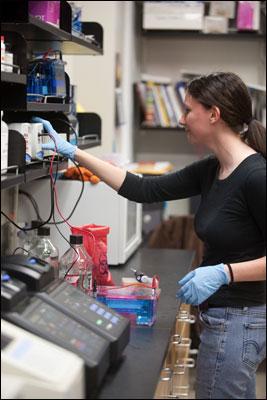
WKU Graduate Student Completes DNA Sequence Of Virus - January 28, 2010
When Ali Wright was considering her college choice, she had plenty of options close to her North Carolina home.
She chose Western Kentucky University because the Biology Department provides opportunities for incoming students to participate in hands-on research activities. “I wasn’t sure I could have had that opportunity at a school back home,” Wright said.
Now, seven years later as Wright is completing her master’s thesis, she has become the first WKU student to complete the entire DNA sequence of an organism – the genome of a bacterial virus.
“It’s a pretty amazing accomplishment for a single student to sequence an entire genome,” said Dr. Rodney King, associate professor of biology, whose research projects include genomic analysis of bacteriophages and phage-host interactions.
At Dr. King’s laboratory in the Complex for Engineering Biological Sciences, Wright finished sequencing and annotating the genome of a bacterial virus isolated from the environment. “Bacterial viruses are the most numerous organisms on our planet and impact bacterial evolution, infectious disease and global processes such as carbon and energy cycling,” he said.
Wright began working in Dr. King’s lab as an undergraduate researcher with a functional characterization of the virus. After completing her bachelor’s degree, she decided to expand her analysis by determining the sequence of the entire viral genome as the thesis project for her master’s degree.
“Completing this project is a tremendous accomplishment and we are fortunate to have the technology and resources available at WKU for this type of endeavor,” Dr. King said. “Ali’s work also is a testament to the importance of undergraduate research.”
To determine the 41,538 base pair of DNA sequence, Wright became proficient in using the DNA sequencing equipment in the WKU Biotechnology Center and in using bioinformatics software to complete the assembly and analysis of the viral genome.
“It was like putting together a puzzle,” Wright said.
Wright’s work on the bacterial virus will now become part of Genbank, the National Institutes of Health’s genetic sequence database.
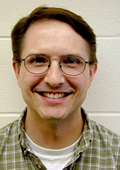
WKU Biology Professor elected as Chair of Division M of the American Society for Microbiology
Dr. Rodney King, Associate Professor of Biology at WKU, has been elected to serve Division M of the American Society for Microbiology. The members of Division M are interested in understanding the biology of bacteriophages; viruses that infect bacteria.
As Division chair, Dr. King will help plan and organize the Division M symposium for the 2010 General Meeting of the ASM. The American Society for Microbiology is the oldest and largest single life sciences organization in the world representing researchers, educators, clinicians and industry professionals engaged in all disciplines of the microbiological sciences. ASM members support their science and their Society by volunteering their service.


WKU Biology Professors Chosen To Participate In Innovative Science Education Forum
Bowling Green, Ky. - Two Western Kentucky University biology faculty members have been invited to participate in the Howard Hughes Medical Institute (HHMI) National Genomics Research Initiative.
Dr. Rodney King (left), associate professor of biology and director of the WKU Biotechnology Center, and Dr. Claire Rinehart (right), professor of biology and director of the Bioinformatics and Information Science Center (BISC), each have expertise in virology, biotechnology and bioinformatics and will use their experience to engage freshmen students in the yearlong HHMI program in scientific discovery.
The genomics research program will start in the fall of 2009 and all entering freshmen who have an interest in science will have an opportunity to apply.
WKU is one of 12 college and universities selected this year to join HHMI’s Science Education Alliance (SEA) which was launched last year when 12 other colleges and universities joined the group in an education experiment with an ambitious agenda -- teach science to students by involving them in scientific discovery on a national scale.
“Interactive lab experiences are a key component of the WKU Biology Department curriculum and we are continually exploring new ways to engage students,” Dr. King said. “We recently implemented a new curriculum, Investigative Biotechnology, which introduces student-directed, problem-based learning at the introductory level. The HHMI science education program will expand our efforts to provide opportunities for our students to become engaged in meaningful original research at the introductory level. In addition, the national scope of the program will facilitate collaboration with other scientists/educators throughout the country.”
WKU’s Bioinformatics and Information Science Center (BISC) also is exploring the development of a certificate and a minor in Bioinformatics, Dr. King said. This is a cross-disciplinary initiative involving the departments of Biology, Mathematics and Computer Science. One course in Bioinformatics and several in statistics and data mining have recently been introduced into the curriculum to support this initiative and there are plans to add additional courses.
“The HHMI program will help us create an introductory pipeline to research experiences that will complement our existing and planned instructional programs and allow WKU freshman to engage in the thrill of discovery,” Dr. King said.
HHMI (http://www.hhmi.org/) created the Science Education Alliance in 2007 in the hope that it would become a resource for science educators from across the nation. It allows faculty to work together to deliver innovative science education programs and bring the excitement of the doing of science directly to students in a novel, collaborative way. The Institute has committed $4 million over four years to the Alliance.
The SEA’s first project is the National Genomics Research Initiative, a two-part, year-long research course offered by colleges and universities selected through a national competition. The course is aimed exclusively at beginning college students, who make real discoveries by doing research on bacterial viruses, called phage. In the first term, the students isolate colonies of phage from locally collected soil samples. Given the diversity of phage, each one is almost certain to be unique, so the students get to name their newly identified life form. They then spend the rest of the term purifying and characterizing their phage and extracting its DNA.
Between terms, the purified DNA is sent to the Joint Genome Institute-Los Alamos National Laboratory in New Mexico, where it is sequenced. In the second term, the students receive files containing their phage’s DNA sequence. The students then use bioinformatics tools to analyze and annotate the DNA from their phage.
WKU and the 11 other new SEA colleges and universities were chosen from among 33 applicants. The schools, ranging from small private colleges to large research universities, will start offering the course in fall 2009. HHMI provides research and laboratory materials and the support from the SEA’s director and a dedicated HHMI staff.
Another four colleges will join the Alliance as associate members. They will attend training sessions that will allow them to implement this research experience in laboratory classes on their campuses. Eventually, HHMI will select at least 36 schools to participate in the genomics research initiative as full members.
The first 12 schools, chosen in 2007, began offering the course in fall 2008. After one term of the course, many faculty who have been teaching the Alliance’s innovative genomics research course to freshmen are now realizing they may never again teach science courses the same way.
“When you visit these schools, you can see that institutional transformation is occurring,” said Dr. Tuajuanda Jordan, director of the SEA program at HHMI. “We have given these educators ammunition to show their colleagues that research courses are a viable way to engage students and possibly retain them in the sciences.”
The new participants in the National Genome Research Initiative are: Brigham Young University, Provo, Utah; Cabrini College, Radnor, Pa.; Calvin College, Grand Rapids, Mich.; Georgia State University, Atlanta; Lehigh University, Bethlehem, Pa.; North Carolina State University, Raleigh, N.C.; St. Joseph’s University, Philadelphia;
University of Colorado, Boulder, Colo.; University of Montana, Missoula, Mont.; University of North Texas, Denton, Texas; University of Puerto Rico, Cayey, Puerto Rico; Western Kentucky University, Bowling Green.
The associate members are: Alabama A&M University, Normal, Ala.; City University of New York, Queen’s College; Culver-Stockton College, Canton, Mo.; Virginia Commonwealth University, Richmond, Va.
(A news release about the project from HHMI is available online at http://www.hhmi.org/news/20090108sea.html)
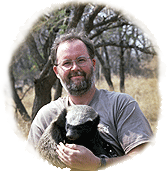
WKU Biology Faculty Member Receives Research Award - April 03, 2008
Dr. Michael Stokes, Professor of Biology at Western Kentucky University, has received the 2008 Special Research Award from the Kentucky Academy of Science.
KAS has awarded WKU a $9,891 grant in support of Dr. Stokes’ research proposal titled “Termitaria: Engineering Biodiversity in Semiarid Lands.” Dr. Stokes and his students will be conducting research into the poorly-described ecology of small animals in East Africa.
The KAS Special Research Award is awarded to faculty at Kentucky higher education institutions, public or private, involved in undergraduate education. Proposals are reviewed by a KAS panel and evaluated according to established criteria. The criteria includes significance of the proposed project within the context of the subfield of the proposed work, feasibility of the project, and measurable goals that can be assessed to verify progress of the investigation. Priority is given to research involving undergraduate students.
The Kentucky Academy of Science (http://www.kyscience.org/) is a non-profit organization whose goals are to encourage scientific research, promote the diffusion of scientific knowledge, and unify the scientific interests of the Commonwealth of Kentucky. Established in 1914, the Academy is an Affiliate of the American Association for the Advancement of Science and the National Association of Academies of Science.
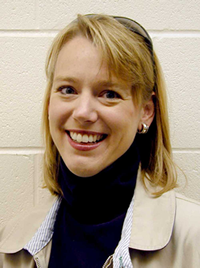
Western Kentucky University will expand its international reach next summer with a medical program in Kenya.
Dr. Nancy Rice, an assistant professor in WKU’s Department of Biology, is working in collaboration with the University of Nairobi to develop “Partners in Caring: a Medical Service-Learning Exchange between Kenya and Kentucky.” The course is scheduled to begin in summer of 2008.
“We have a large number of pre-professional students in pre-medicine and pre-dental and this program is designed with them in mind to get service learning,” Dr. Rice said.
“Partners in Caring” builds on a memorandum of understanding between WKU and the University of Nairobi. WKU has been working with the Kenyan school in recent years on a biodiversity and conservation project.
The course will be taught with the support of Dr. Michael Collins and Dr. Richard Clouse, both family practitioners, and Dr. Kelly Kries, a pediatrician. The program’s objective is to develop a partnership among WKU pre-medical students, local physicians, University of Nairobi medical students and Kenyan physicians in order to enhance health in the Kasigau region of Kenya.
“Students, though participation in rural medical clinics led by our partnering physicians, will gain an appreciation of Kenyan culture and medicine and learn about the epidemiological challenges facing a third-world country while having a substantive, engaged international learning experience,” Dr. Rice said. “This is a unique opportunity for our students,”
In December, Dr. Rice, Dr. Collins and Dr. Clouse visited Kenya to establish formal ties with the University of Nairobi Medical School and to perform a needs assessment of the Kasigau area.
Residents of the region are poor and have no electricity or water. Access to medical facilities is limited to just three communities in the region.
And those facilities are “very primitive,” Dr. Clouse said. “They’ve made use of what they have.”
The group did surveys to get basic information and history of the villages and determine their health needs, which include childbirth education, HIV education, proper use of medications and use of mosquito nets to prevent malaria.
While the physicians will provide medical treatment, the students will take vital signs and medical histories of patients. “What we found out was that we can do a lot of good,” Dr. Rice said. “We’d like to make this a sustainable program.”
Once the program is established, the goal will be to make trips every six months during summer and winter terms. The program also will include opportunities for Kenyan students and physicians to visit WKU and the Bowling Green region.
“We don’t want to go in and change their culture; we’d also like to foster concern among the Nairobi students for their own people,” Dr. Rice said. “There is such poverty that if you make it to medical school you face a difficult choice in going back to an impoverished area.”
The first group of WKU students in the “Partners in Caring” course will be selected this fall. The selection process will be intensive because students will have to be prepared for the living conditions in the rural region, Dr. Rice said. “It’s a life-changing experience,” she said.
Once students are selected, they will complete a seminar course next spring on Kenyan culture, herbal medicine and health care in the Third World and will receive some basic medical skills training from the partner physicians.
In the summer of 2008, the medical group will travel to Kenya along with WKU’s biodiversity group.
“This program will be a win-win for the students and the university,” Dr. Clouse said. “If I was 18 again, I might have done it because it’s something you don’t get to do every day.”
Dr. Clouse and Dr. Collins are looking forward to working with the pre-professional students.
“I’ve always liked to work with students,” Dr. Collins said. “The pre-med students will really get a benefit from this course.”
More WKU news is available at http://www.wku.edu/. If you’d like to receive WKU news via e-mail, send a message to WKUNews@wku.edu.
For information, contact Nancy Rice at (270) 745-5995.
If you're an alumnus, please drop us a line and let us know what you've done since graduation. You can send updates to us at the Department of Biology, Western Kentucky University, One Big Red Way, Bowling Green, Kentucky 42101 or Fill out the on-line form on the Alumni Page or Send an email to Dr. Ken Crawford at Kenneth.Crawford@wku.edu.
Some of the links on this page may require additional software to view.

